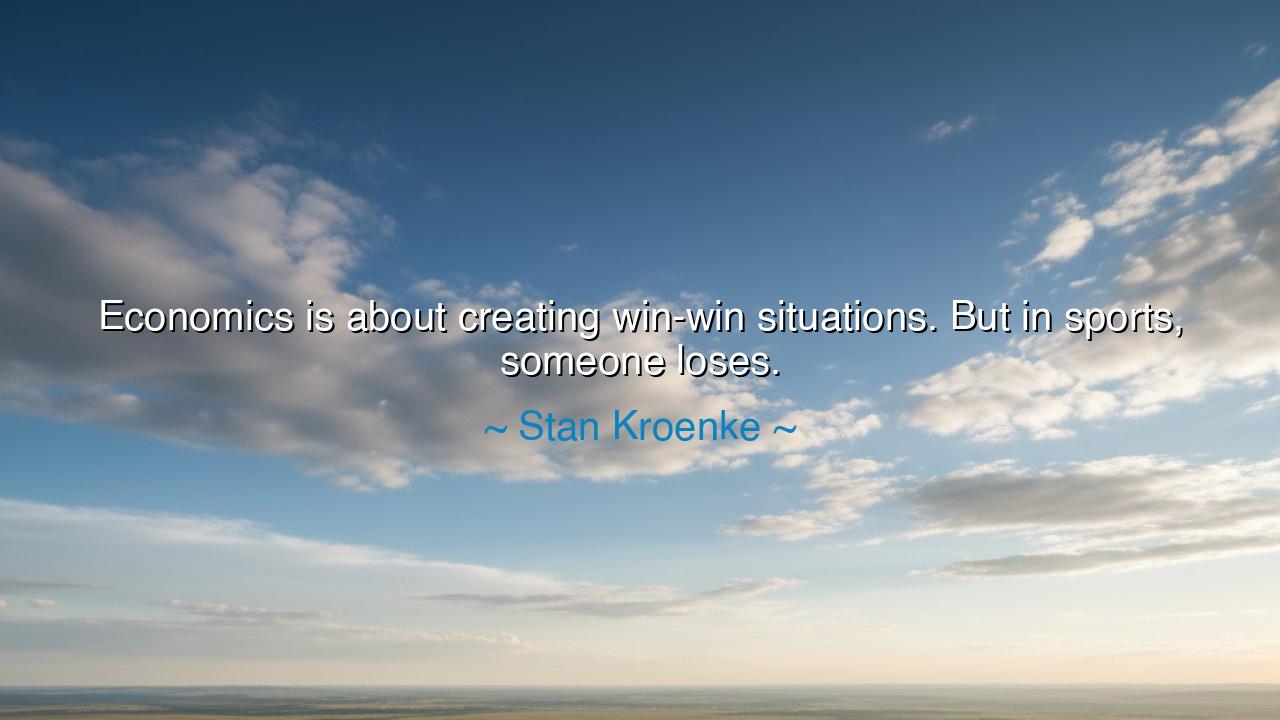
Economics is about creating win-win situations. But in sports






When Stan Kroenke declared, “Economics is about creating win-win situations. But in sports, someone loses,” he laid bare a striking contrast between two realms of human striving. In economics, the ideal is harmony—a transaction where both sides gain, where the merchant profits and the buyer receives value, where trade builds bridges of mutual benefit. Yet in sports, the arena is carved from conflict itself. There, triumph exists only because defeat shadows it. One cannot rise as champion without another tasting the bitterness of loss.
The ancients knew this duality well. In the markets of Athens, commerce thrived upon cooperation, each party satisfied by the exchange of goods. But in the stadiums of Olympia, the contests were unforgiving. The runner who crossed the line first received the laurel, while the others faded into obscurity. Thus, Kroenke’s words remind us that human endeavor oscillates between these two poles—cooperation and conflict, the shared gain of trade and the singular glory of victory.
This contrast shapes our spirit. In economics, we learn negotiation, trust, and compromise, seeking solutions that enrich all. In sports, we learn resilience, courage, and humility, facing the reality that not all can win. To live fully, one must embrace both worlds: the art of building win-win bonds, and the strength to endure win-lose struggles. For life, in truth, is not one or the other—it is both, and wisdom lies in knowing when to pursue harmony and when to accept contest.
History gives us vivid examples. Consider the Treaty of Westphalia, which ended the Thirty Years’ War in Europe. It was a triumph of economic-like compromise, a settlement where nations found balance, each gaining something, each yielding something, so that all might live in peace. Contrast this with the battles of gladiators in Rome’s Colosseum, where the crowd roared as one man’s survival required another’s end. Kroenke’s statement holds both pictures together: the cooperative spirit that sustains societies, and the competitive spirit that electrifies arenas.
And yet, there is wisdom even in losing. In sports, defeat is not destruction, but education. The one who falls learns humility, perseverance, and the fire to rise again. Unlike economics, where all parties may walk away content, in sports the sting of loss becomes a crucible for growth. The losing athlete may one day return stronger, transformed by the pain of failure into the strength of resolve. Thus, though someone loses, no one is truly wasted, for even loss holds a lesson.
The lesson for us is this: learn to walk in both worlds. In your dealings with others, seek the win-win spirit of economics—build relationships, foster cooperation, and value the good of all. But when you step into contests, whether in sports, in business rivalries, or in life’s tests, accept that there will be winners and losers. Do not despair in loss, nor become arrogant in victory, but take from each the lesson it offers.
Practically, this means cultivating both generosity and competitiveness. In your work, look for ways where all can prosper; in your challenges, embrace the struggle even when it demands endurance. When you win, honor the opponent; when you lose, honor yourself by rising again. For harmony and conflict together forge the whole of human greatness.
Thus, Stan Kroenke’s words echo with timeless wisdom: in economics, seek the win-win; in sports, accept the win-lose. Both are teachers, both are necessary. Together, they remind us that the human spirit is forged not only in the joy of shared prosperity but also in the crucible of struggle, where even in losing, one learns to rise stronger.






AAdministratorAdministrator
Welcome, honored guests. Please leave a comment, we will respond soon